Hitz Technical Review Vol.83
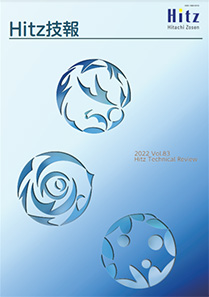
- 1.Development of a Method for Predicting the Effects of Wind Turbine Wakes Using Field Measurement and Operation Data
- 2.Demonstration Experiment of Barge-Type Floating Offshore Wind Turbine under Typhoon Conditions and Development of Coupled Analysis Model
- 3.Experimental Study of Impact Breaking Wave Pressure Acting on Offshore Structures
- 4.Development of Second-Generation Compact Marine SCR System for Two-Stroke Diesel Engines
- 5.Carbon Recycled Methane as Marine Engine Fuel —Toward Achieving Net Zero-Carbon Fuel
- 6.Remote Management and Operation Technology for Waste Pit & Waste Crane
- 7.Study of Magnetic Positioning System for Incineration Plants
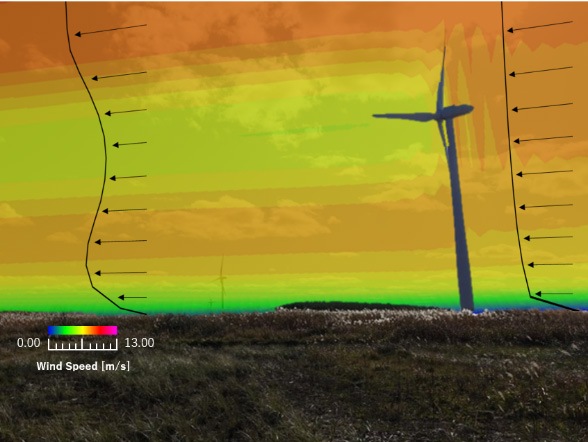
Accurate prediction of the impact of wind turbine wake on power generation and wind turbine life is a very important factor in assessing the business feasibility of wind farms. Hitachizosen has conducted joint research with Associate Professor Takanori Uchida of the Research Institute of Applied Mechanics at Kyushu University and Toshiba Energy Systems & Solutions Corporation, and worked on the development of a versatile wind turbine wake model. In the observation of actual wind turbine wakes conducted at Omonogawa Wind Power Plant, we clarified the wind speed dependence of wind speed deficits and the relationship between the measured values and values predicted from the Park wake model widely used in commercial applications through observation using a vertical profiling Doppler lidar. From an analysis of the wind turbine operation data, we confirmed the same tendency as the observation results as well as the relationship between turbulent flow intensity and wind direction fluctuations and the wind speed loss. With the CFD porous disc wake model developed through the joint research, we reproduced the Omonogawa Wind Power Plant calculations and achieved a wind speed prediction error of the wind turbine hub height of within ±5%.
- Lead author
- Masaki Inui
- Joint author
- Tadasuke Yoshida, Koichiro Shibuya, Keisuke Umazume
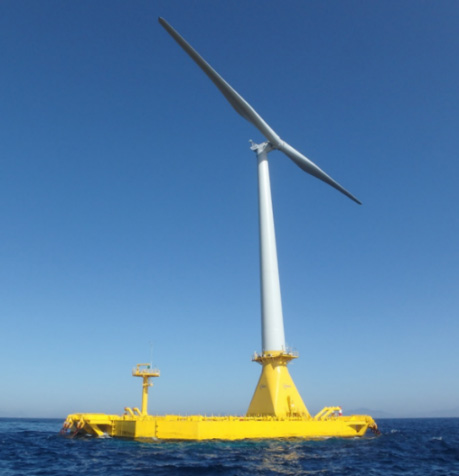
Hitachizosen installed a 3 MW barge-type floating offshore wind turbine (FOWT) in Kitakyushu, in southern Japan, and started demonstration experiments in 2019 as part of a project commissioned by the New Energy and Industrial Technology Development Organization (NEDO) to verify the feasibility of a low-cost FOWT suitable for moderate water depths of 50–100 m. To investigate the dynamic behavior of the FOWT in extreme conditions, we measured the floater's motion data during Typhoon Tapah on 23 September 2019. We then compared the measurement data with coupled analysis results to verify the validity of the coupled analysis. This paper reports on the results. In general, the coupled analysis results showed good agreement with the measurement data in high wave height conditions. However, some discrepancies appeared in the shorter wave periods, with low wave heights and large changes in wave direction. The possible causes of these differences are also discussed thoroughly in this paper.
- Lead author
- Hideyuki Niizato
- Joint author
- Ko Matias Adrian Kosasih, Hideyuki Suzuki (The University of Tokyo) , Shigeki Okubo, Shunsuke Mitani
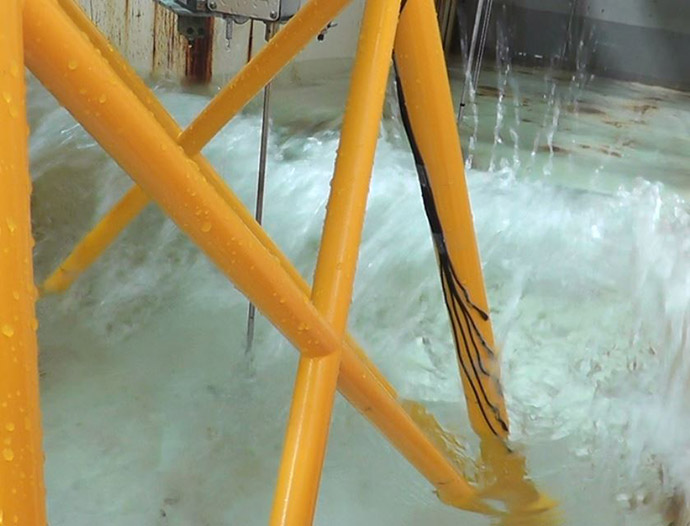
In the design of offshore structures, structural strength is required to withstand stormy weather conditions such as typhoons. During stormy weather, turbulent sea conditions cause waves to break. The impact force received from a breaking wave (hereinafter referred to as "impact breaking wave force") is evaluated using a theoretical formula in the case of an upright wall, but this formula is not applicable to offshore structures with complex shapes. Therefore, we conducted model experiments to clarify the location at which offshore structures are subjected to the impact pressure of a breaking wave (hereafter referred to as "impact breaking wave pressure") . Although prior wave testing had been essential to ensure accurate collision of a plunging breaker with the structure, our numerical analysis confirmed the collision position of the plunging breaker and eliminated the need for wave testing. In addition, we succeeded in measuring impact wave breaking pressure at low cost and in a short period of time because we were able to generate plunging breakers without an inclined plate in the wave tank. From the present experimental results, we derived an experimental equation that can be used to estimate the location of the maximum value of impact wave breaking pressure generated from the plunging breaker. By substituting the water depth and the maximum height reached by the breaking wave into this experimental equation, the pressure sensor can be appropriately placed at the location where the impact force occurs and is to be obtained in the model experiment.
- Lead author
- Hiroki Tamura
- Joint author
- Hideyuki Niizato, Hiroaki Kihara
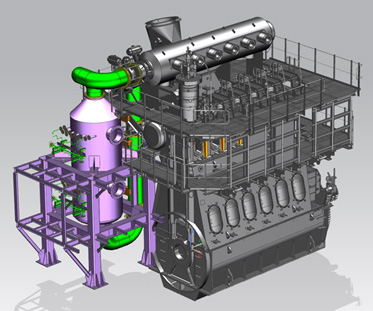
As part of its efforts to limit the emission of environmental pollutants, the International Maritime Organization (IMO) enforces controls on nitrogen oxide (NOx) emissions from marine diesel engines. Its strict Tier Ⅲ controls, requiring NOx reductions of about 80%, have been in place for vessels operating in some areas since 2016. At Hitachizosen, we drew on our land-based SCR technologies, including NOx removal catalysts, to develop a marine SCR system that satisfies Tier III standards in 2010, and following on-board tests, launched our first commercial SCR system in 2017. After delivery, in response to the customer's request for a system even smaller in size, we improved on our high-pressure SCR system HP-SCR Mk-I and developed a more compact second-generation system, HP-SCR Mk-II, and delivered the first unit in 2020. The HP-SCR Mk-II was welcomed by the customer for the space savings achieved by removing the vaporizer that was essential in the HP-SCR Mk-I. This paper reports on the technical challenges of and our solutions to commercializing the HP-SCR Mk-II, and presents our future proposal of a supporting structure based on the HP-SCR Mk-II for further space savings and simplified rigging work.
- Lead author
- Shigeki Okazaki
- Joint author
- Shintaroh Abe, Yuto Mori, Eri Kajiue, Sho Kodama
5. Carbon Recycled Methane as Marine Engine Fuel —Toward Achieving Net Zero-Carbon Fuel[PDF:4,546KB]
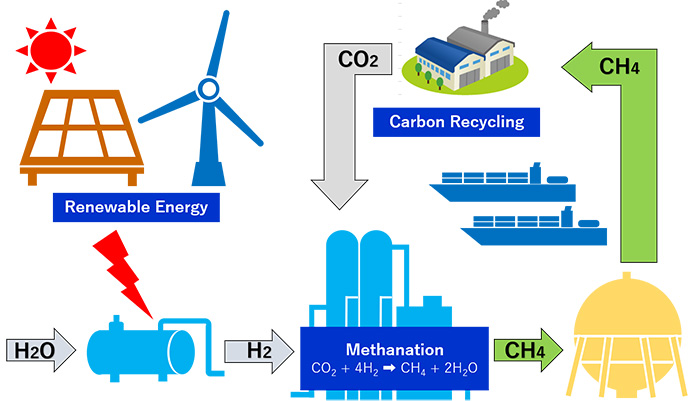
The International Maritime Organization (IMO) adopted "The Initial IMO Strategy on Reduction of GHG Emissions from Ships" in April 2018, setting out a vision with quantified GHG reduction targets: 1) to reduce carbon intensity (i.e., CO2 emissions per transport work) of international shipping by at least 40% by 2030 compared to 2008, 2) to reduce the total annual GHG emissions from international shipping by at least 50% by 2050 compared to 2008, and 3) to phase out GHG emissions from international shipping as soon as possible in this century. In order to achieve this goal, it is necessary to convert the fuel for ships from heavy oil to low-carbon and zero-carbon fuel, and candidate fuels include LNG (methane) , methanol, ammonia, and hydrogen. Hitachizosen aims to develop and commercialize methanation technology for synthesizing methane from hydrogen generated by renewable energy and from carbon dioxide emitted by industry. The carbon-recycled methane production technology we developed can achieve a conversion efficiency of 99% or more, which is close to the theoretical value. In addition, a trial calculation of the energy balance in each process of the supply chain found that carbon-recycled methane can be regarded as a net zerocarbon fuel, and that CO2 emissions can be significantly reduced through future efforts. We believe that using carbon-recycled methane produced by this methanation technology as a marine engine fuel will contribute greatly to carbon neutrality in the future.
- Lead author
- Naohiro Murata
- Joint author
- Kouichi Izumiya
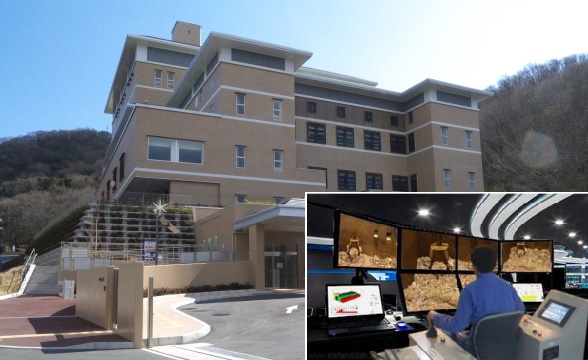
In our efforts to develop completely automated waste crane control systems using AI technology, we at Hitachizosen have worked to improve automation rates (i.e., the percentage of automated control time to total uptime of a crane system) while ensuring stable furnace operations. The results of a demonstration test we performed on a system based on our proprietary "Waste Pit & Waste Crane 3D System" equipped with an AI algorithm at the Matsuyama Nishi Clean Center (Ehime Prefecture) show that we achieved an automation rate of close to 100%. To back up on-site operations in case a plant requires manual control owing to sudden changes in waste properties or a disruption of normal operations by a pandemic or disaster, we also developed a control technology for managing waste pits and operating waste cranes from a remote location. We performed demonstrations with this remote system at the Hadano Clean Center (Kanagawa Prefecture) , and as a result, achieved complete continuous operation for 24 hours on one weekday from our facility A.I/TEC in Osaka.
- Lead author
- Terushi Hirabayashi
- Joint author
- Kaoru Kawabata, Yohei Oura, Akifumi Ise, Yukio Onuki, Hayato Yaji, Toshikatsu Masuoka, Yuya Kimura, Motoshi Hirako (Fuji Hoist Industrial Co., Ltd.) , Hiromitsu Oda (Fuji Hoist Industrial Co., Ltd.)
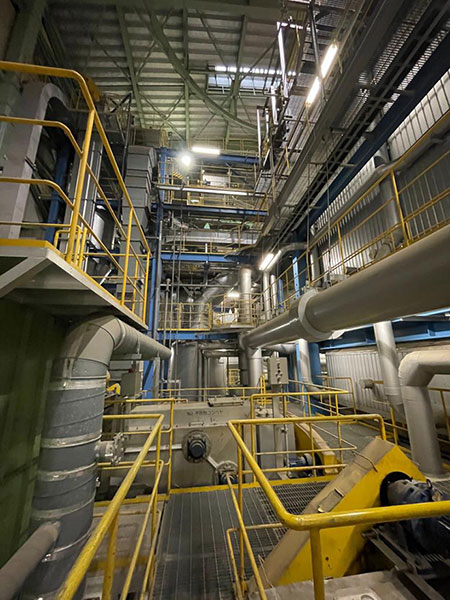
At Hitachizosen, we investigated an indoor positioning method for the purpose of improving the safety management and work efficiency of workers in incineration plants. For the indoor positioning method, we used magnetic fingerprinting, which can reduce the cost of infrastructure introduction. However, it was impossible to obtain practical accuracy in an incineration plant because the larger the target area, the lower the accuracy. We then took advantage of the unique magnetic field formed from the structural features of the incineration plant, and succeeded in devising a differential matching method based on the knowledge obtained from positioning by magnetic trend. With this differential matching method, we confirmed that the target route can be positioned with about 93% accuracy. As for floor estimation, we confirmed the effectiveness of verification using a linear regression formula of air pressure difference and a machine learning method using received signal strength indicator (RSSI) of low-power widearea (LPWA) network as a feature value. The results suggested that by combining magnetic difference matching in the aisles with Evaluation of Complementary Indoor Positioning System with Wi-Fi and Geomagnetic Fingerprinting1) in the work space, it is possible to realize a low-cost, high-precision indoor positioning system in an incineration plant.
- Lead author
- Yutaro Atarashi
- Joint author
- Kaoru Kawabata, Rei Okumura (Nara Institute of Science and Technology) , Takuya Matsunaga (Nara Institute of Science and Technology) , Ismail Arai (Nara Institute of Science and Technology)
Click here for inquiries about Kanadevia technology
